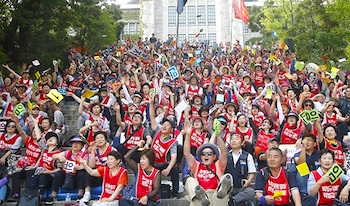
Since President Moon Jae-in’s promise of the new Special Law on Preventing Discrimination against Non-Regular Workers, the government has been working on converting part-time workers to permanent employees. On Aug. 20, a guideline of regular employees in the public sector was announced, aiming to grant regular positions to over 100,000 temporary workers by the end of this year.
In August, each public university formed a Committee of Employee Turnover. While some universities - both public and private - have managed to settle negotiations with custodial staff, improving working conditions of laborers is still an ongoing issue for the rest.
After several labor union protests for a wage raise, Ewha recently agreed to raise this year’s minimum wage from 6,950 won to 7,780 won. While the wagebargaining is done annually, the Office of General Administration stated that they cannot be sure if there will be a wage rise next year.
“I am still unsatisfied with the raised amount, but it is quite a relief that the wage did increase,” said one ECC custodian. “I am a little worried about the wage rise next year and so forth, as nobody knows what will happen.”
Kyung Hee University was the first university to convert nonregular workers to permanent employees. Because they granted the workers with permanent positions two years before the government’s announcement, their guidelines were informally called the “Kyung Hee Model.” The guideline presented on Aug. 20 did not apply to Kyung Hee University as it was required only of public universities. However, the school managed to take on the total number of approximately 135 temporary custodians after establishing their subsidiary company of Industry Collaboration Foundation Techno Holdings. This meant that the subsidiary company would employ the workers for the school instead.
“Ever since the establishment of School Custodians Union in 2011, many students including the student council came together to form a joint committee titled ‘Accompany (Dong Haeng),’” said Jaju, Kyung Hee’s 49th student council. “During the union strike students supported the workers by participating in the press conference and learning more about their labor conditions.”
However, the labor unions and the student council are still working on achieving direct employment as the subsidiary company might bring disadvantage to the workers.
Although indirect employment through the affiliated company has some merits, such as a stabilized environment, it also has financial drawbacks as the company has to pay about 10 percent of value added tax and their own maintenance. After the necessary payments, the company would be left with little profit, limiting them from making improvements for the laborers’ wages and working conditions. Nonetheless, Kyung Hee aims to show other schools that there can be other ways to help unions to achieve better working conditions.
There have been some changes in other universities as well. After several negotiations with the unions, KAIST, Duksung Women’s University, and Kwangwoon University have decided to add 830 won to the current minimum wage.
Laborers in other universities had to gather for many more protests to reach a raise. During a heated protest in July at Yonsei University, the head of Office of General Administration who was to solve the problem, did not show up in his office, and the school’s main building was shut down. Although the union has been insisting a 830 won raise since January, the school suggested only 100 won. After the wage increases of other universities, students also stood to support them. As a result, Yonsei finally accepted the 830 won wage rise on Aug. 18.
“It is a relief now that the employees are able to work under better conditions, and I feel so much admiration for their persistence of standing up for their rights,” said Ahn, a Yonsei freshman. “I hope the school continues to maintain a wellrounded relationship with the union.”

